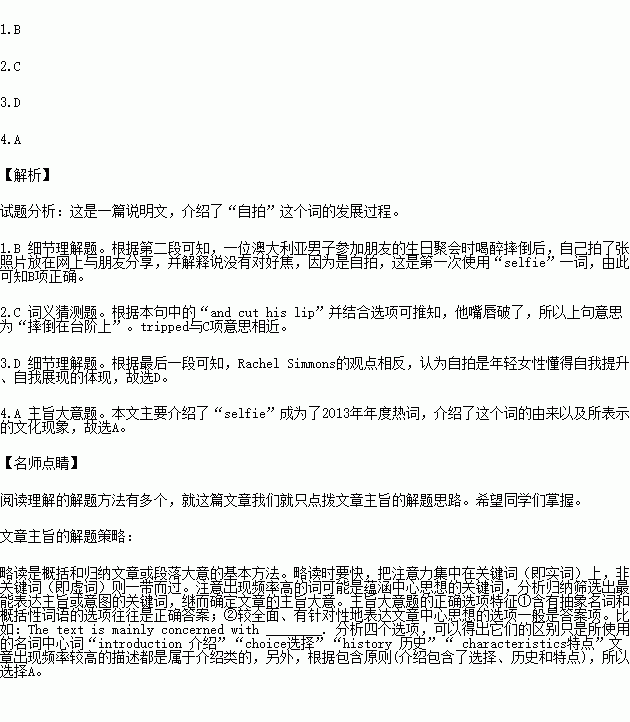题目内容
“Selfie” (自拍) joins ranks of dictionary words.
In 2002, an Australian man went to his friend’s 21st birthday party. He got drunk, tripped on some steps and cut his lip. He took a picture of his injuries and shared it with his friends on an online forum. “And sorry about the focus,” he wrote, “it was a selfie.” That was the first recorded use of the word “selfie”, according to linguistic experts at Oxford Dictionaries.
On Nov 19, Oxford Dictionaries declared “selfie” Word of the Year for 2013, in honor of the term having taken over the world thanks to millions of smart phone self-portraits and the resulting shares on social media.
So what does the choice of the word say about our culture? Mary Elizabeth Williams, writing in Salon magazine, says the word reminds us that contemporary culture is defined by our narcissism(自恋).Megan Jackson from a local newspaper points out a selfie may only focus on appearance.
Selfies invite judgment based on appearance alone. What kind of cultural influence does this have on women? Erin Gloria Ryan on Jezebel says selfies teach young woman to obsess over their appearance and judge themselves on the basis of beauty rather than accomplishments. “They’re a reflection of the warped way we teach girls to see themselves as decorative,” said Ryan.
In Slate magazine, Rachel Simmons has the opposite view. She argues that selfies are an example of young women promoting themselves and taking control of their own self-presentation. Think of each one, she says, as “a tiny pulse of girl pride —a shout-out to the self”.
1.Which of the following is true about the first use of “selfie”?
A. The Australian man created it to celebrate his friend’s 21st birthday.
B. The Australian man created by chance when he got drunk and shared his photo online.
C. The Oxford Dictionary used it to thank the creation of smart phone.
D. The social media were so advanced that they made the word transmitted.
2.The underlined word “tripped” in the first paragraph probably means “________”.
A. traveled B. stepped lightly
C. fell down D. made mistakes
3.Who holds a positive opinion towards selfie in the life of women?
A. Mary Elizabeth. B. Megan Jackson.
C. Erin Gloria Ryan. D. Rachel Simmons.
4.The text is mainly concerned with ________.
A. the introduction of the word “selfie”
B. the choice of the word “selfie”
C. the history of the word “selfie”
D. the characteristics of the word “selfie”

